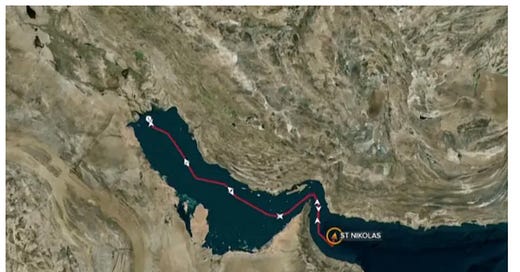No punishment for Chinese banks' NK money flows; Crackdown on NK trade officials in PRC; Iran seizes oil tanker; Russia and Iran can connect without SWIFT
Prohibited Transactions for the week of 8 Jan 2024 (#33)
North Korea
A report by the Democratic staff of the US House of Representatives Oversight Committee states that hotels and businesses owned by then-President Donald Trump received almost USD8 million in funds from foreign governments, which would violate the US Constitution’s foreign emoluments clause. The report notes that the Industrial and Commercial Bank of China (ICBC) was identified in 2016 by the US Department of Justice (DOJ) as being involved with a PRC-based illicit sanctions evasion network tied to the DPRK’s weapons programs. However, despite pleas from his own party, Trump did not designate or take other actions against ICBC. //The illicit network that used ICBC was centered around Dandong Hongxiang Industrial Development Co. Ltd (DDHX). This was a case I closely followed, and which served as the basis for a large portion of my research into identifying the transactional activity of North Korean illicit actors. ICBC wasn’t the only Chinese bank used by DDHX and its network of front companies. If you read the DOJ’s civil forfeiture complaint, there were 11 other Chinese banks involved. As far as I can remember, other than the Section 311 Action against Bank of Dandong that was finalized in November 2017, none of the other banks faced any consequences from the US for their roles in processing DDHX transactions.
South Korea’s National Intelligence Service confirmed that HAMAS is using North Korean-made weapons. Pyongyang continues to deny this, and the US government stated there are no “indications” of any “sort of cooperation militarily between HAMAS and North Korea.” //As discussed in Issue #25, weapons from the DPRK would likely travel to Iran, then Sudan, then to Egypt before being smuggled into the Gaza Strip.
According to covert reporting from inside North Korea, officials from the Ministry of State Security are cracking down on the country’s trade officials who are stationed in the PRC, by monitoring cell phone activity and doing surprise inspections of their houses. //As discussed in Issue #11, trade officials are very much involved with raising funds for the regime and procuring goods for the elites in country. It’s not clear if something specific is triggering this crackdown, or if it is just part of the government’s general desire to keep their overseas officials on a short leash.
North Korean hackers Lazarus Group have been observed moving USD1.2 million of stolen funds — in the form of bitcoin — from a coin mixer to a holding wallet.
South Korea’s defense minister said the DPRK may sell short range, tactical guided missiles to Russia for use in its invasion of Ukraine.
The US State Department sanctioned three Russian entities and one individual involved in the transfer of DPRK-origin ballistic missiles to Russia for testing.
Russian tourists may be the first foreign visitors to visit North Korea since the outbreak of the COVID-19 pandemic. According to social media posts, five-day tours of Pyongyang and a ski resort are being offered to Russians.
Iran
The Iranian navy seized an oil tanker, the St Nikolas, in the Gulf of Oman. This tanker was previously known as the Suez Rajan and was seized by the US government in April 2023 for illicitly transporting Iranian oil, as discussed in Issue #18. //The tanker appears to still be operated by Greece-based Empire Navigation. A little surprised the company would take the risk of having the tanker sail so close to Iranian waters. Considering Iranian maritime behavior in recent times, did they really think that Tehran — which already threatened any company involved in the offloading of oil from the vessel after it was seized by the US — would just ignore the vessel as it sailed past?
Turkmenistan and Turkey are in preliminary talks about transiting Turkmen gas westward to Turkey, via Iranian pipelines. A similar swap deal already exists between Turkmenistan, Azerbaijan, and Iran, where the north of Iran receives gas from Turkmenistan, and then an equivalent amount of gas is sent from Iran to Azerbaijan. //This gas swap has been temporarily cut off due to a dispute between Ashgabat and Baku. Tehran gets a 15 percent fee from the existing gas swap and may push for a similar amount if a deal can be reached between Ashgabat and Ankara. //The fee to Iran is paid in cubic meters of gas, and is a relatively small amount compared to Iran’s daily consumption. But these types of infrastructure deal are as much about money as about making Tehran an indispensable neighbor in the region.
Russia and Iran have “connected” their respective financial message transfer systems, and banks from the two nations can directly establish correspondent banking relations, without the need to use the SWIFT messaging system.
Iran’s sovereign wealth fund is in discussions with Russia — as well as Oman and Saudi Arabia — about setting up joint investment funds.
An Iranian trade official noted that 80 percent of their exports go to five nations, the PRC, Iraq, Turkey, the United Arab Emirates (UAE), and India.
Tehran is almost entirely dependent on the PRC to purchase illicit Iranian oil, and must offer a 12 to 15 percent discount to Beijing, which is taking on the risk of ignoring international sanctions.
Iranian media is pushing back on a Reuters story claiming that oil trade between the two countries had stalled as Iranian suppliers are demanding a reduced discount from their Chinese customers.
Iranian lawmakers have given the Central Bank of Iran (CBI) the power to pursue Iranian funds from Bahrain’s banks. //Unstated in this article is that the dispute is likely about the USD270 million awarded to Tehran from an international arbitration panel regarding Future Bank, which was majority owned by Iranian banks, and accused of money laundering and sanctions evasion by Manama, as well as designated by the US government.



